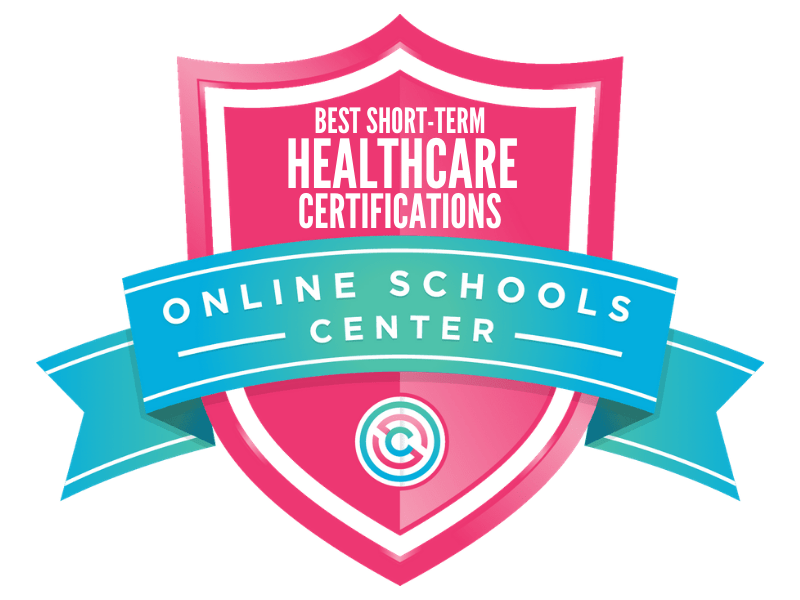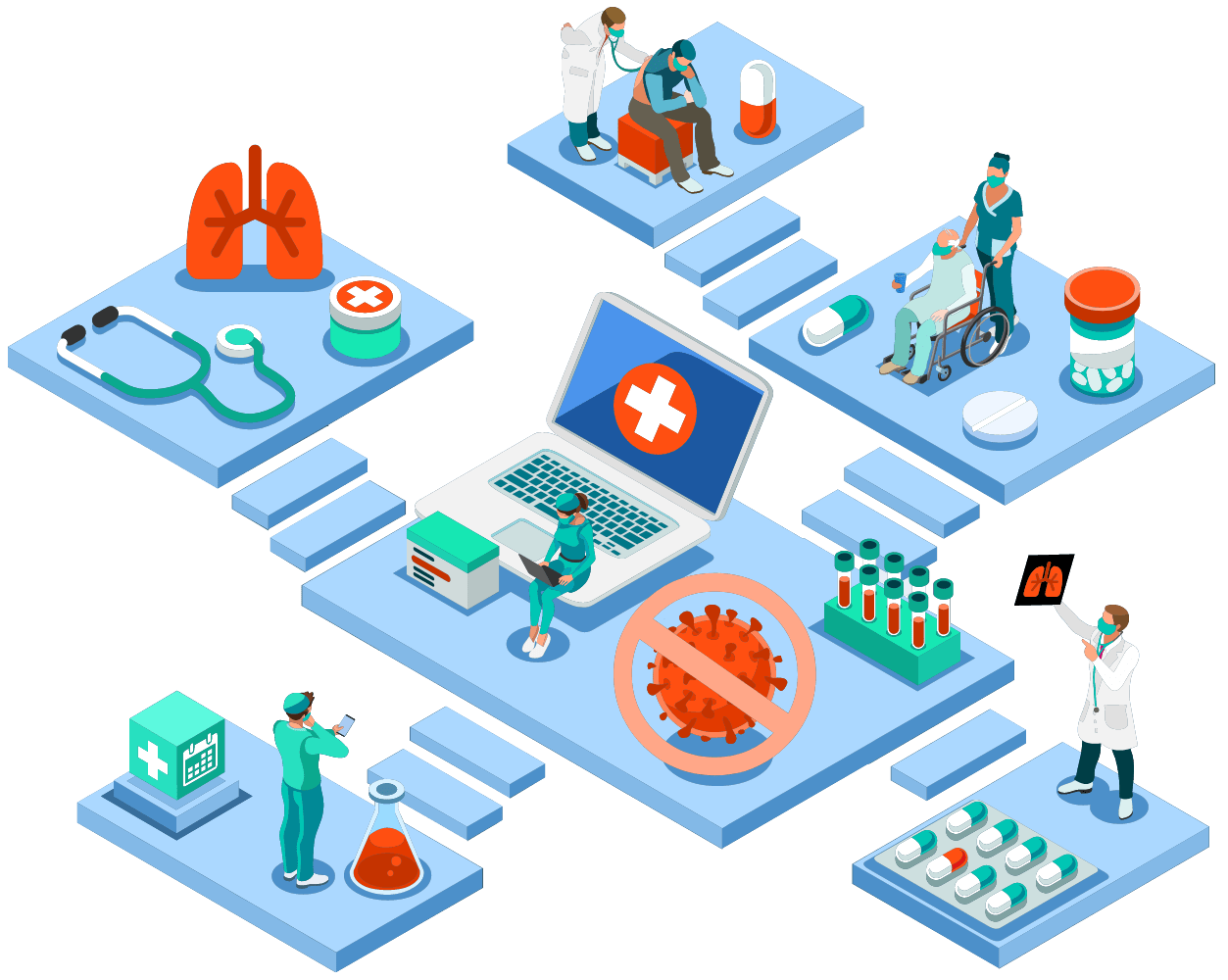
Being in the healthcare industry has its ups and downs. You’re likely to work long hours, including overnight shifts, be exposed to stressful situations, and be involved in physical work. You may also encounter emotionally challenging situations, including sickness and death, and on a quite regular basis, too.
But, there are more reasons to be part of the healthcare industry! Healthcare employment has a 15% forecasted growth from 2019 to 2029, or an increase of 2.4 million jobs, a faster-than-average growth. Such impressive industry growth can be attributed to a large aging population, better access to health insurance, and medical advances.
Here are more reasons to consider a healthcare career. With industry growth comes more job opportunities and better job security for people with the right credentials. Your career advancement will partly depend on your ability to get appropriate training.
Numerous healthcare jobs are available, from aides to specialists, and it’s possible to get a job with a high school diploma and short-term certificate training. Many of these are in-demand jobs too, offered in various settings from clinics to hospitals, hospices, and schools.
Many healthcare jobs are among the most well-paying jobs considering the amount of time, energy, and money spent on becoming qualified for them. Even the entry-level jobs pay better than those in other industries with similar education and training requirements! Plus, the more training you possess, the more career advancement opportunities you will have and the better your compensation will be.
With exciting developments, there’s no room for career stagnation and boredom in healthcare! You will find new jobs being created to keep pace with these developments.

Of course, there’s also the opportunity to make a positive difference in people’s lives. No matter your work, you can impact the lives of patients and their families, as well as on communities.
The best thing about a career in the healthcare industry is that you can get a well-paying job with 12 months or less of post-secondary training through certification programs! You don’t need to study for several years and spend thousands of dollars – and get into neck-high student debt – on a bachelor’s degree.
With a certification program, you will receive intensive classroom instruction and externship training in a clinical setting. You will also have appropriate knowledge and eligibility to sit for a certification exam, if necessary. Afterward, you can qualify for an entry-level job in your field of study and take it from there.
All of these life achievements in just over a year, too! The shorter duration combined with, the lower tuition and other costs make certification programs appealing for many cohorts. High school students who want to start a career in healthcare as soon as possible find the under 12-month programs a great stepping stone. Working professionals looking for a change in career or better salary find these programs suitable to their lifestyle, too.
But don’t be fooled by the short-term aspect of these certification programs! You’re training for an uber-competitive industry where professional credentials are highly valued, and lives are at stake. Hard work coupled with intelligence, people skills, and commitment must complete a certification program and pass its corresponding certification exam.
With that said, here are our top 20 picks in short-term certification programs to jumpstart your career in the healthcare industry. We chose them based on their short-term duration (i.e., 12 months or less), good job opportunities and compensation, and opportunities for career advancement. These certification programs can lead to an associate degree in a related field that, in turn, can boost opportunities for higher positions.

Take note that these are hybrid programs with a mix of virtual and face-to-face sessions. Most of the classroom discussions are done online, but the externship aspect must be in-person sessions. There’s no substitute for hands-on learning when training for a healthcare career!
- Cardiovascular Technologist Certification Program
- Neurodiagnostic Technologist Certification Program
- Electronic Health Records Specialist Certification Program
- Surgical Technologist Certification Program
- Central Service Technician Certification Program
- Medical Records and Health Information Technician Certification Program
- Dental Assistant Certification Program
- EKG Technician Certification Program
- Medical Office Specialist Certification Program
- Hemodialysis Technician Certification Program
- Phlebotomy Technician Certification Program
- Social and Human Services Assistant Certification Program
- Medical Assistant Certification Program
- Pharmacy Technician Certification Program
- Patient Care Technician Certification Program
- Medical Transcriptionist Certification Program
- Psychiatric Technician Certification Program
- Occupational Therapy Aide Certification Program
- Veterinary Assistant Certification Program
- Physical Therapy Aide Certification Program

Cardiovascular Technologist Certification Program
Program Length: 12 months
Median Wage: $57,720 per year
Career Opportunities: Cardiology technician / Cardiac monitor technician
Cardiovascular technologists require formal education and, in most cases, a professional certification for their specialized tasks. The fastest route is a certification program offered in community colleges and universities, even in some hospitals. The best programs have accreditation from the Commission on Accreditation of Allied Health Education Programs (CAAHEP).
The typical coursework is a combination of classroom study and an externship in a hospital, an imaging laboratory, or a physician’s office. Students in an externship program must work under the supervision of a certified cardiovascular technologist. The curriculum includes courses in non-invasive and invasive cardiovascular procedures and anatomy, biology, and physiology.
Students must also master the basics of cardiovascular technology, pharmacology, medical instruments and their uses, and cardiovascular hemodynamics. Minimum grade requirements may also be imposed, and it must be noted that cardiovascular technology programs are among the most challenging.
These programs allow students to choose their specialty, too. According to CAAHEP, the current specializations include:
- Adult echocardiography
- Pediatric echocardiography
- Non-invasive vascular study
- Invasive cardiovascular technology
- Cardiac electrophysiology
Graduates can take the certification exam for cardiovascular technicians. Keep in mind that state certification rules vary widely, and there are a few certification organizations. The latter includes Cardiovascular Credentialing International (e.g., certified cartographic technician), American Registry of Diagnostic Medical Sonography (e.g., registered vascular technologist), and American Registry of Radiologic Technologists (e.g., vascular sonography). Certified cardiovascular technologists and related professionals must also comply with continuing education requirements, such as completing courses and participating in workshops.
Best Online Schools: Santa Fe College in Gainesville, Florida
Forsyth Technical Community College in Winston-Salem, North Carolina

Neurodiagnostic Technologist Certification Program
Program Length: 12-18 months
Median Wage: $50,000 per year
Career Opportunities: Neurodiagnostic technologist / EEG technician
Also known as an electroencephalographic (EEG) technician, a neurodiagnostic technologist performs complex procedures that assist doctors in their work. These include electroencephalograms (EEG), polysomnograms for sleep studies, and evoked potentials (EP), which require fairly advanced training.
Said training can be acquired through certification programs offered in technical and community colleges. These programs can last between 12 and 18 months and combine classroom sessions and practical training. The latter involves the actual operation of the tools and technologies used on the job, and, thus, supervision by an experienced neurodiagnostic technologist is a must.
These are also considered entry-level programs where holders of a high school diploma or equivalent may be eligible. But there are also programs where prospective students are required to possess previous post-secondary graduation and healthcare experience. Most programs also prepare their students to pass the professional certification exam; employers also prefer certified neurodiagnostic technologists on their team.
The coursework includes the fundamentals of neuroscience and its related diseases and disorders. Students also learn about electroneurodiagnostics and its technology, EEG lab management, electrocardiography, and clinical correlations. Due to the complex nature of the brain and nervous system, students must put in the hard work in understanding them, too.
A few of the organizations that offer certification are:
- American Board of Electrodiagnostic Medicine
- American Board of Registration of Electroencephalographic and Evoked Potential Technologists
- American Association of Electrodiagnostic Technologists
Each of these organizations has specific eligibility requirements, so be sure to ask. Applicants may be required to provide proof of training in CPR and/basic life support, too. As with most, if not all, healthcare jobs, continuing education requirements must be met to maintain certification status.
Best Online Schools: Laboure College of Healthcare in Milton, Massachusetts
Institute of Health Sciences in Hunt Valley, Maryland

Electronic Health Records Specialist Certification Program
Program Length: 3-6 months
Median Wage: $49,000 per year
Career Opportunities: Electronic health records specialist / Health information technician
Electronic health records (EHR) specialists are considered essential in the healthcare industry because electronic records are stored and updated in online databases. Their jobs also make it possible to enjoy the perks of a home-based or remote career. But a strong work ethic and a fast, secure Internet connection are vital.
Most employers also prefer professional certification as proof of appropriate training. Errors in health records can have devastating consequences on all parties.
EHR specialist certification programs have extensive coursework despite the short-term period. The typical courses include:
- Current standards in health information technology
- Rules and regulations related to electronic health record software
- Privacy and security issues in electronic health information and its technology
- Workflow management
- Exchanging and sharing health information with patients, doctors, and other stakeholders
- Electronic prescription and physician order entry
- Information about regional health information organizations and their basic operations
- Development and management of electronic health records in clinics, hospitals, and hospices
The training acquired in these programs prepares students for the challenging demands of the job. EHR specialists must be accurate in their work, particularly in electronic documentation of physician orders and patient care. Their tasks include reviewing patient records for accuracy and completeness, discussing patient information with doctors and insurance professionals, and auditing patient records.
Best Online Schools: Towson University in Towson, Maryland
ed2go in San Francisco, California

Surgical Technologist Certification Program
Program Length: 12 months
Median Wage: $48,300 per year
Career Opportunities: Surgical technologist / surgical assistant
States like Indiana, Massachusetts, and Nevada require surgical technologists to be certified by the National Board of Surgical Technology and Surgical Assisting. Other states, such as Colorado, North Dakota, and Washington, require surgical technologists to register as part of their work eligibility.
These certification or registration requirements can be partly satisfied through the completion of an accredited surgical technologist program. Numerous vocational schools and community colleges, as well as teaching hospitals and universities, offer these programs. The duration of each program widely varies, from less than 12 months to 24 months.
Education is also a combination of classroom work and practical training in healthcare settings like clinics and hospitals. The classroom work prepares students not just for the certification exam but for the demands of the job. The courses may include:
- Introduction to surgical technology, including its history, development, and trends
- Patient care and safety
- Physiology
- Anatomy
- Microbiology
- Pharmacology
- Surgical procedures
- Operating room principles and practices
Clinical rotations under the supervision of doctors and experienced surgical technologists are also common experiences. Many certified surgical technologists may also undergo on-the-job training for career advancement, such as becoming first assistants.
On the job, surgical technologists perform numerous complex tasks, too. These include sterilizing equipment, preparing the operating room for surgery, and readying patients for operations. They may also assist surgeons during operations, keep an inventory of equipment, and maintain a sterile environment. Indeed, they are vital members of a healthcare team, too!
Best Online Schools: Northcentral Technical College in Wausau, Wisconsin
Linn-Benton Community College in Albany, Oregon

Central Service Technician Certification Program
Program Length: 4-8 months
Median Wage: $48,230 per year
Career Opportunities: Central service technician
Central service (CS) technicians, or sterile processing technicians, perform critical roles in preventing infections in hospitals and other healthcare settings. Hospital-acquired infections can cause serious financial and medical consequences on patients and healthcare workers, as well as on the healthcare industry itself.
These professionals are in charge of cleaning, sterilizing, and processing medical supplies and assembling, storing, and distributing them. Their work area is a hub of activity, considering that most healthcare activities require properly sterilized supplies, equipment, and tools, from patient care to surgical operations.
Proper training is then a must, and it’s acquired through CS technician certification programs offered in many community colleges and healthcare institutes. Here, students learn about the principles and practices of sterilization and sterile processing with coursework that includes:
- Cleaning, decontaminating, and sterilizing of surgical instruments
- Understanding medical terminology
- Patient privacy and safety
- Aseptic techniques
- Quality assurance
Many programs also include professional development and ethics courses for a holistic approach. Students are also required to complete an internship program in a third-party facility, such as a hospital or clinic, as part of a team.
The best programs also prepare students to pass the certified registered CS technician exam, an entry-level certification. The exam will test the applicants’ proficiency in cleaning, decontamination, disinfection; sterilization process; and documentation and record maintenance. There are 150 questions in the exam, which has a three-hour completion time.
Best Online Schools: LaGuardia Community College in New York City, New York
New York Institute of Career Development in New York City, New York

Medical Records and Health Information Technician Certification Program
Program Length: 8-12 months
Median Wage: $42,630 per year
Career Opportunities: Registered health information technicians / Certified tumor registrar / Medical coders / Coding specialists
Certification programs for aspiring certified medical records and health information technicians may have competitive admission requirements. High school students planning to become one are well-advised to take biology, health, math, and computer science courses. These courses can better prepare them for the intensive courses in anatomy and physiology, medical terminology, and coding systems, among others, in the post-secondary programs.
Students learn about the theoretical and practical aspects of their chosen profession and prepare for a certification exam. Getting certified will open doors of opportunities and reinforce your professional capacity in the workplace. While health information technicians don’t perform direct patient care services, their work involves direct dealings with other healthcare professionals. These can include clarifying diagnosis and treatment, getting more relevant information, and auditing records for completeness and accuracy.
Furthermore, health information technicians enjoy a dynamic profession! With the ever-evolving developments in electronic health records, their jobs also require them to keep up with the times. Many of them must also work with software development teams to develop better systems and troubleshoot issues.
Best Online Schools: Houston Community College in Houston, Texas
Northern Virginia Community College in Annandale, Virginia

Dental Assistant Certification Program
Program Length: 9-12 months
Median Wage: $40,080 per year
Career Opportunities: Dental assistant
Becoming a dental assistant typically requires completion of a post-secondary certification program and compliance with certification requirements. The latter may involve passing a certification exam and earning continuing education credits to maintain certification status. Be sure to check that the program is recognized by certification organizations like the Dental Assisting National Board, Inc and accredited by the Commission on Dental Accreditation.
Most of these programs are offered in community colleges, although there are also technical and vocational schools with similar programs. Many of these programs take 12 months or less to complete and, once completed, lead to a certificate and possible certification eligibility.
Accredited programs offer a mix of classroom work and laboratory experience (i.e., externship). Students will then have a good idea of what it’s like to work as a dental assistant. Their coursework includes learning about dental terminology, instruments used in dentistry, and the performance of daily tasks. Their training not only focuses on the technical aspects of dental assisting but also on patient care, safety and relations, appointment scheduling, and recordkeeping.
Dental assistants have also been trained in tasks that require technical skills. These include sterilizing equipment and treatment areas, taking and processing x-rays, and using dental equipment. Their work involves direct interactions with dentists and patients that can become challenging, too.
Best Online Schools: Indiana University in Indianapolis, Indiana
Lake Area Technical Institute in Watertown, South Dakota
Sinclair Community College in Dayton, Ohio

EKG Technician Certification Program
Program Length: 2-3 months
Median Wage: $39,100 per year
Career Opportunities: EKG technician
EKG technicians and cardiology technologists perform different tasks. Suffice it to say that the former work on general monitoring tests while the latter perform more complex tasks. Such distinction is important since their education and training credentials are different, with EKG technicians being in an entry-level job.
On-the-job training is an acceptable route toward becoming an EKG technician, and it takes 4-6 weeks under the supervision of an EKG supervisor or cardiologist. But if you want a more intensive training and certification status, then go for a certification program in a community college or other institutions.
EKG technician certification programs cover a wide range of topics in classroom discussions alongside hands-on laboratory experience. The topics include anatomy and physiology, medical terminology, and the appropriate use of the EKG machine and its accessories. Students learn the legalities of patient care and safety, too!
The next step in becoming a certified EKG technician is passing the Cardiovascular Credentialing International’s certification exam. Known as Certified Cardiographic Technician (CCT) credential, it’s a preferred credential where employers are concerned. Graduates of relevant certification programs may also choose the EKG exam administered by the American Society of Phlebotomy Technicians.
Best Online Schools: Texarkana College in Texarkana, Texas
University of Tennessee in Martin, Tennessee

Medical Office Specialist Certification Program
Program Length: 9-12 months
Median Wage: $37,576 per year
Career Opportunities: Medical office specialist / Health claims examiner / Patient account representative
Medical office specialists choose when it comes to their workplace, from hospitals, clinics, and hospices to allied healthcare organizations. Their training allows them to perform vital roles in keeping the day-to-day operations in their workplaces as effective and efficient as possible. Their duties include greeting guests, keeping medical records, and dealing with billing concerns, among other administrative tasks.
Take note that medical office specialists are known by other names, such as medical secretaries and medical office assistants. Regardless of the name, their credentials include completion of a relevant certification program and voluntary certification. Most programs offer specializations, too, such as medical coding for billing and insurance purposes.
Admission into medical office specialist programs isn’t highly selective. But applicants must possess a high school diploma or its equivalent and demonstrate proficiency in the English language and keyboarding skills. The program’s curriculum itself has its challenges that students must learn to overcome through hard work.
The coursework emphasizes practical knowledge and skills in recordkeeping and filing, medical billing procedures, and medical coding. There are also courses in ethics and law in medicine, basic medical diseases and treatments, and business communication. Soft skills, including professionalism and people skills, are also emphasized.
While certification isn’t a requirement for employment, most employers prefer it. Voluntary certification can be acquired from the American Academy of Professional Coders and the Board of Medical Specialty Coding.
Best Online Schools: The College of Healthcare Professions in Houston, Texas
Kennesaw State University in Kennesaw, Georgia

Hemodialysis Technician Certification Program
Program Length: 6-12 months
Median Wage: $39,000 per year
Career Opportunities: Hemodialysis technician
Hemodialysis technicians are part of a healthcare team, including doctors and nurses who provide patient care to end-stage renal disease patients. Permanent kidney failure requires regular dialysis treatments wherein excess fluids, waste products, and toxins are removed via dialysis machine.
The hemodialysis technician certification program prepares students for the technical tasks of maintaining and cleaning dialysis machines, monitoring patients undergoing dialysis, and educating patients about their treatment. Aside from classroom discussions, students must also undergo a hands-on experience in a dialysis center. Their externship is usually under the supervision of an experienced certified dialysis technician and other healthcare professionals.
The program’s coursework includes courses on:
- Anatomy and physiology of the kidneys
- Principles of hemodialysis
- Manifestations and complications of kidney failure
- Chemistry in dialysis
- Patient care, safety, and confidentiality
- Dialyzer processing
- Water treatment
- Professional development
Certification requirements vary between states, with the eligibility requirements set largely by nephrology organizations in every state. These organizations include the Nephrology Nursing Certification Commission, a clinical hemodialysis technician certification (CCHT), and the Board of Nephrology Examiners Nursing and Technology with its hemodialysis technician certification (CHT).
Best Online Schools: Utopia Health Career Center in Kissimmee, Florida
Gwinnett Technical College in Lawrenceville, Georgia
University of Tennessee in Martin, Tennessee

Phlebotomy Technician Certification Program
Program Length: 4-8 months
Median Wage: $35,510 per year
Career Opportunities: Phlebotomist / Phlebotomist pediatric specialist
Certified phlebotomy technicians draw blood from patients. These are used for blood tests, transfusions, blood donations, and research. The blood samples are part of the diagnosis and treatment of various diseases and disorders, from anemia to hemophilia. Many of these professionals also provide information about the process to patients and assist in adverse reactions.
Becoming one isn’t possible without a formal education in a post-secondary, typically certification, program. The training in a phlebotomy technician program involves coursework in topics like:
- Verifying identity in preparation for blood extraction
- Easing patient anxiety before the procedure
- Explaining the process and purpose for the blood extraction
- Drawing blood from patients and donors
- Labeling the vial of blood for proper identification
- Processing specimens
- Entering patient information into records or databases
Aside from class discussions, students must also undergo hands-on training via externships. Afterward, graduates can pursue certification status from one of these organizations:
- American Society of Phlebotomy Technicians
- National Phlebotomy Association
- National Healthcareer Association
- National Center for Competency
- American Medical Technologists
Each organization has its own certification requirements, such as completing a certification program, hands-on experience as a phlebotomist, and documented venipunctures. Certification opens doors of opportunities to work in community health centers, clinical laboratories, blood donation centers, and hospitals.
Best Online Schools: Mayo Clinic College of Medicine and Science in Jacksonville, Florida
American National University in Salem, Virginia
Texarkana College in Texarkana, Texas

Social and Human Services Assistant Certification Program
Program Length: 9-12 months
Median Wage: $35,060 per year
Career Opportunities: Clinical social work aide / Addictions counselor assistant / Human service worker
Interested individuals can work as social and human services assistants with a high school diploma plus on-the-job training. But many employers have a preference for post-secondary education and professional certification in related disciplines. These include human services, social or behavioral sciences, and gerontology.
The level of education in social and human services has a huge impact on the type of job and responsibilities given in the workplace setting. Assistants with certification-related training are more likely to get higher-level positions and better pay than those with only a high school diploma. We then suggest completing the requirements of a social and human services certification program, which may lead to an associate’s degree, too.
Students learn how to interview and observe patients, handle individuals in crises, and carry out treatment plans prescribed by higher-up professionals. Hands-on experience through fieldwork or externship strengthens the knowledge and skills learned in class lectures and discussions.
These programs also offer specializations like substance abuse, pediatric or gerontology, and mental illnesses. These specializations have distinctive challenges so that the curriculum will be different.
Best Online Schools: Clarkson College in Omaha, Nebraska
Ashworth College in Norcross, Georgia

Medical Assistant Certification Program
Program Length: 6-12 months
Median Wage: $34,800 per year
Career Opportunities: Administrative medical assistants / Clinical medical assistants / Podiatric medical assistants
While a high school diploma and on-the-job training can get your feet wet as a medical assistant, these may not be enough for your career advancement. Again, the healthcare industry places a premium on formal education and externships. Aspiring medical assistants are well-advised to enroll and complete an accredited certification program.
Community colleges and technical/vocational schools are the most popular venues for relevant programs. While many schools offer 2-year programs leading to an associate degree, you may want to consider shorter-term certification programs. The latter provides the necessary training, including classroom and laboratory experiences for the job.
The coursework varies, but programs typically require their students to complete an externship period in a hospital or physician’s office, among other approved sites. The training prepares students for the wide range of clinical and administrative tasks commonly performed in the workplace. These tasks include recordkeeping of patient information, measuring vital signs, and giving patients their medications or injections.
Certification as a certified medical assistant is possible through the American Association of Medical Assistants.
Best Online Schools: California State University in San Bernardino, California

Pharmacy Technician Certification Program
Program Length: 12 months or less
Median Wage: $33,950 per year
Career Opportunities: Pharmacy technician
Most pharmacy technicians work in hospitals and retail pharmacies, and their job involves medical, administrative, and people-related tasks. These include collecting patient information for prescription purposes, measuring medication and packaging prescriptions, and organizing inventory. Their job also requires working under the supervision of pharmacists and dealing with patients and their concerns.
These tasks require formal training, too, so that these can be performed according to workplace standards. Pharmacy technicians in some states are allowed to mix some medications, a task that demands more advanced training.
The best formal training in terms of time and cost: Pharmacy technician certification programs prepare students for a certification exam, among other purposes. Check that the program you’re enrolling in is accredited by either the Accreditation Council for Pharmacy Education or the American Society of Health-System Pharmacists.
These programs teach students about pharmacy calculations, medications, names and administration, and pharmaceutical ethics and laws. Students are also provided with direct, hands-on experience in a pharmacy setting, which can count toward eligibility for certification. According to ASHP, these programs must include at least 600 hours of instruction delivered over 15 weeks, minimum.
Getting your certification as a Pharmacy Technician can be either through the National Healthcareer Association or the Pharmacy Technician Certification Board. You must also obtain a state license and complete continuing education requirements to maintain your certified pharmacy technician status.
Best Online Schools: University of Alaska in Anchorage, Alaska
State Fair Community College in Sedalia, Missouri
Minnesota West Community and Technical College located in Granite Falls, Minnesota

Patient Care Technician Certification Program
Program Length: 3-6 months
Median Wage: $33,942 per year
Career Opportunities: Patient care technician / Hospital caregiver / Emergency department technician
While being a certified patient care technician isn’t among the highest-paying jobs in healthcare, it’s rewarding work! You will interact with patients and assist them through a challenging time in their lives. You may also appreciate that becoming one neither takes a long time nor places extreme demands on your mind and body.
The best patient care technician programs also combine class lectures, discussions, and exams with clinical experiences and laboratory work. The coursework covers the essential knowledge and skills for the job, including first-aid procedures, electrocardiography, and CPR. There may also be courses in infection control, patient communication, and hemodialysis practices.
Students are also trained in drawing blood, performing urinary catheterizations, and providing wound care. Indeed, your training can become the foundation of higher-level education, such as becoming a registered nurse!
The American Medical Certification Association (AMCA) is among the most recognized certification organizations for certified patient care technicians. The nearly three-hour certification exam consists of 144 questions for EKG topics, anatomy, medical terminology, and phlebotomy, to name a few.
Best Online Schools: Pima Medical Institute in Albuquerque, New Mexico
U.S. Career Institute in Fort Collins, Colorado
Lincoln Tech in Iselin, New Jersey

Medical Transcriptionist Certification Program
Program Length: 6-12 months
Median Wage: $33,380 per year
Career Opportunities: Medical transcriptionist
Medical transcriptionists are also healthcare workers who ensure smooth behind-the-scenes operations, particularly for complete, accurate, and updated recordkeeping. Their main job is listening to voice recordings made by other healthcare workers and then converting them into written transcripts or reports. Their job may also involve reviewing and editing documents, interpreting medical abbreviations and terminology used in patient documents, and using speech recognition technology.
Due to the demanding nature, aspiring medical transcriptionists study medical terminology, physiology and anatomy, and risk management in healthcare situations. Their English grammar and other language skills must also be exceptional since clarity is as important as completeness and accuracy.
Becoming a gainfully employed medical transcriptionist doesn’t necessarily require certification. But you may want to consider it, nonetheless, since it’s proof of your competency.
Certifications include Certified Healthcare Documentation Specialist (CHDS) and Registered Healthcare Documentation Specialist (RHDS). Both are offered by the Association for Healthcare Documentation Integrity, and both require passing an exam and continuing education.
Best Online Schools: U.S. Career Institute in Fort Collins, Colorado
Everett Community College in Everett, Washington

Psychiatric Technician Certification Program
Program Length: 12 months or less
Median Wage: $32,020 per year
Career Opportunities: Psychiatric technician / Mental health aide / Behavioral technician / Psychiatric nursing aide
The types of patients that psychiatric technicians deal with in their work are varied and, thus, the job doesn’t feel too routinary. Their day-to-day work may see them working with severely developmentally disabled children and adults, people with drug and alcohol addiction, and patients with mental illnesses. Their job involves providing patients with therapeutic care that, on its own, can be both challenging and rewarding.
The common formal training is a post-secondary certificate in psychiatric or behavioral technology. While the names of the courses vary, these programs provide education in psychology, counseling, biology, and supervised work experience in a healthcare setting. The combination of academic work and structured work experience is vital toward becoming an effective psychiatric technician in the future.
The structured work experience may include on-the-job training and attendance in lectures, seminars, and workshops. Take note that there may be an unsupervised on-the-job training component involved, too.
Whether you will pursue a license or a certification as a psychiatric technician will depend on the state where you intend to find a job. In California, for example, you must apply for a license that involves passing a licensure exam. You may also pursue professional certification via the American Association of Psychiatric Technicians (AAPT).
Best Online Schools: Kennesaw State University in Kennesaw, Georgia
InterCoast Colleges in Rancho Cordova, California

Occupational Therapy Aide Certification Program
Program Length: 9-12 months
Median Wage: $29,230 per year
Career Opportunities: Occupational therapy aide / Occupational therapy technician / Restorative coordinator
Among the best things about becoming an occupational therapy (OT) aide certification are the fairly easy academic and training requirements. Aspiring OT aides usually need a high school diploma or a GED for admission into a certification program. Most of these programs are short-term, between nine and 12 months, and with affordable tuition fees.
Students prepare for their future job as OT aides by engaging in classroom lectures and participating in on-the-job training. Certifications in basic life support and CPR are also on the agenda.
Once you graduate, you should be able to perform a broad range of tasks, including:
- Assist OT professionals who provide direct patient care
- Set up OT equipment and then put them away after treatment
- Lift and transfer patients
- Prepare treatment areas
- Perform administrative tasks like scheduling appointments, filing documents, and answering calls and emails
- Take inventory of materials, supplies, and equipment
- Assisting with billing and insurance forms
There are no certification exams for OT aides. You may, however, take your training as a foundation toward becoming a certified OT assistant.
Best Online Schools: Penn Foster in Scottsdale, Arizona
Ashworth College in Norcross, Georgia

Veterinary Assistant Certification Program
Program Length: 12 months or less
Median Wage: $28,590 per year
Career Opportunities: Veterinary assistant / Laboratory animal caretakers
As with many entry-level healthcare jobs, becoming a veterinary assistant doesn’t necessarily require formal training in a classroom setting. But if you want to have a competitive edge, perhaps get higher pay, you must consider becoming a certified veterinary assistant!
Being one demonstrates your competency in relevant subjects, including animal health and welfare, animal husbandry, and animal facility administration. Your certification training will prepare you for the demanding tasks ahead, including:
- Feeding, bathing, and exercising animals in your care
- Assisting veterinarians during examinations and procedures
- Cleaning, disinfecting, and maintaining veterinary equipment and instruments
- Caring for and monitoring animals in post-surgery situations
- Assisting in first-aid, emergency care procedures, and surgery
The National Association of Veterinary Technicians in America (NAVTA) is the go-to organization for certification as a veterinary assistant.
Best Online Schools: Penn Foster in Scottsdale, Arizona
Animal Behavior College in Santa Clarita, California

Physical Therapy Aide Certification Program
Program Length: 9-12 months
Median Wage: $27,000 per year
Career Opportunities: Physical therapy aide
Emphasis must be made that physical therapy (PT) aides may not be allowed to provide direct patient care, a job that usually falls to PT assistants. Instead, PT aides perform numerous non-medical tasks that make it easier for physical therapists and PT assistants to perform their jobs.
But that isn’t to say that PT aides get inferior training! PT aide certification programs train students to perform tasks including:
- Assisting in patient intake
- Transporting patients
- Preparing equipment, supplies, and materials for treatment
- Documenting responses and progress in patients without arriving at a diagnosis or treatment plan
- Act as liaison between hospital personnel and physician’s clinics
- Maintain cleanliness of reception and treatment areas
The programs may include medical terminology, body mechanics, anatomy and pathology, and infection control. Externships are also preferred, if not required, for certification purposes. The AMCA Physical Therapy Technician/Aide certification is a plus for job-hunting purposes.
Best Online Schools: Houston Community College in Houston, Texas
SUNY Corning Community College in Corning, New York

If you’re deeply interested in the healthcare industry, enroll in these best healthcare certification programs and get one foot in the door! Think carefully and determine the one that suits your aspirations, lifestyle, and budget best!